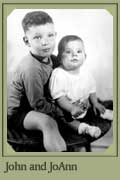According to JoAnn, Raymond's oldest daughter, he was very popular with the prisoners at Alcatraz because he was kind and would save cigarettes and sandwiches for them, especially those in solitary confinement who were normally given nothing but bread and water. Because of his natural kindness and friendliness, he proved to be the only guard who could walk into the midst of an unruly group of prisoners, break them up and send them back to their cells. As noted earlier, Raymond had a side to his nature that was easy-going and humorous and it is difficult to surmise how these traits could have been acquired in his youth. They became over time an extremely important part of his self-image, as though he had made up his mind not to be embittered or negatively affected by the hardships of his early life in Xenia.
In February, 1923 Raymond re-enlisted after discharge and was assigned to the Finance Department. By this time he and the army had definitely refined his aptitudes. Apparently however, he was required to sacrifice his corporal rank upon leaving the Guard Corps. He soon made up for this loss in rank, serving in the Finance Department from 1923 to 1929, where he slowly advanced his career.
There was a first, unsuccessful marriage to an older woman (her name has not survived) during the mid-1920's and it soon ended in divorce. Raymond, however, did not tell his second wife about this first marriage until many years after they had been married.
Raymond certainly crisscrossed the United States several times on various military orders. Travel and constant change were by this time becoming a stimulus he could not live without. "Wherever I hang my hat, that's my home," he would say. He met his second wife on one of his northeastern assignments and he and Grace Frederick Tate were married on August 2, 1928 at Fort Niagara, New York. Private First Class Myers had been promoted to Technical Sergeant, Finance Department, on August 7, 1925. On April 30, 1926 he had received a diploma at Washington DC stating he had "Satisfactorily completed the Regular Course at the Finance School."
A son, Raymond John, was born on October 10, 1929 in San Francisco, California.
In the little spare time Raymond could find from army and family responsibilities, he liked to play poker with army buddies and later discovered horse racing. These leisure time activities must have recalled that mythos, that memory of those independent, gambling men who always got the better of chance. He would continue to balance this very marginal mythos of freedom against a very weighty life of service.
As to his religious and spiritual beliefs, like many military officers (for example, George S. Patton) he was a firm believer in reincarnation. So firm was this belief that he was convinced he had retained a memory of his death by execution in a prior life. From a moral point of view, belief in reincarnation was beneficial, and the purpose of each life was to leave the world a better place to return to, with perhaps greater opportunity or advantage in the future life.
At some point during the two world wars he became a mason and this probably contributed to his belief in reincarnation and his profound musings on destiny.
 |
 |
|

